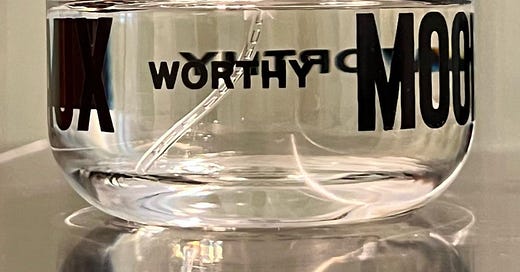I came down with a case of melancholia the other morning while opening marketing emails. “Be Your Own Valentine,” one subject line instructed, “This fragrance is a ‘hug in a bottle!’”
What upset me wasn’t so much the attempt to consumerize an experience that can only come from communion with other human beings — the beauty industry already offers “secure attachment” in a serum and “soulcare” as skincare and the “best life” in a hair oil; why not an embrace from an eau de toilette, too?
What upset me was the realization that a “hug in a bottle” apparently sounds appealing enough to the general public that a beauty brand is willing to put its PR budget behind it; that a company can mass-produce a perfume called Worthy — yes, that’s the product name, you really can’t make this stuff up! — and trust it will attract customers.
How did we fall for the sad, sterile version of love the beauty industry sells us?
Maybe it seems oversensitive to get so worked up about marketing copy. Maybe actualization-adjacent product names like Confidence In A Cream seem silly and lighthearted and harmless. But I don’t think so! I think there’s something deeper and darker and potentially harmful happening here!
“Consumer culture in particular encourages lies,” bell hooks writes in her book All About Love. “Advertising is one of the cultural mediums that has most sanctioned lying. Keeping people in a constant state of lack, in perpetual desire, strengthens the marketplace economy. Lovelessness is a boon to consumerism. And lies strengthen the world of predatory advertising. Our passive acceptance of lies in public life, particularly via the mass media, upholds and perpetuates lying in our private lives.”
The (false) messages we absorb from marketing materials affect the way we experience the world.
When beauty advertisements tell us physical manipulation is the surest pathway to spiritual fulfillment, of course we’re increasingly categorizing cosmetic injectables as care and plastic surgery as therapy and anti-aging as a return to self.
When beauty culture tells us disconnection is necessary to the cause — discouraging touch because might cause acne, discouraging smiling because it might cause wrinkles, encouraging Botox even as it decreases our emotional connection to others and ourselves — of course we’re more disconnected than ever before, and touching less, and having less sex. (“Everyone Is Beautiful & No One Is Horny.”)
When the beauty industry tells us we have to dissociate to participate — we must learn to either love or numb the pain of its acid exfoliators and chemical peels and plucking and waxing and syringes and surgeries — of course we’re anxious, depressed, dysmorphic, disordered, obsessive, and hurting ourselves.
And when the standard of beauty is increasingly inhuman and inhumane; when it seeks to make us optimizable machines or commodities made up of meta-commodities; when it promotes individual “empowerment” over collective liberation; when it’s coerced through a system of cultural, social, financial, and political punishment? Of course we’re isolated and lonely in a way that threatens public health and even our lives! Of course we’re experiencing “record levels of feeling sad or hopeless”! Of course we have low self-esteem, despite consuming Self-Esteem Serum at an astonishing rate! (The beauty industry is growing faster than it has in over a decade.)
We are so beautiful, and so broken.
I don’t mean to say all the pain the world is a direct result of dissociative beauty norms. Correlation is not causation, blah blah blah, beauty standards are just one factor among many larger factors here, and culture shapes them as much as they shape culture — a real chicken-or-the-aesthetic-egg situation, you know? I only mean to point out that, at the very least, industrialized beauty is not solving the problems it purports to solve. The more jars of hope it sells, the less hope we have.
Anyway!
Happy Valentine’s Day. Skip the hug in a bottle. Go hug a human.





Omg. It’s like my brain just blew up all over my screen here! I AM into over scrutinizing ad copy! Mainly b/c I’ve been an marketing & promotional professional for 3 decades. My father was a (M)ad Man in the 60’s and I learned a lot from his trade publications (I was a weird kid). I love picking ads apart and finding the ‘sweet spots’ where the words , music and other distractions obscure any actual meaning. If you choose a TV/video ad for a beauty or health product and write down every word, then read it back to yourself, and you’ll discover the sweet spot: a ton of drivel and maybe some semi-unsubstantiated claims (beauty products get a wide berth on ‘claims’, as do makers of supplements). That said, it’s the subliminal messaging that screws with your head, your heart, your self confidence vs maybe your logic. It’s the kind of thing that sets the bar for Valentines Day, what I’d call a Hallmark holiday, much too high. God forbid a woman should be alone on this of all days. Is there a Worthy for men as well? Will we find that ad in Maxim? Likely not (even if there is a mens version).
Sending you a virtual hug for this enlightening piece!💙❤️💜